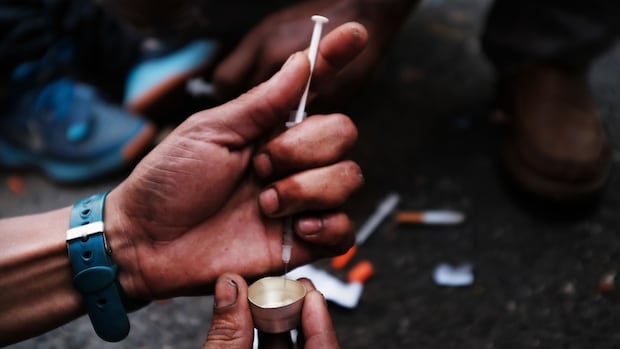Ottawa·NewA recent police initiative aimed at combating public drug use in Kingston, Ont., ended with the majority of those arrested being offered treatment instead of a criminal record.Of more than 100 arrests during summer initiative, only 5 resulted in criminal chargesCBC News · Posted: Sep 19, 2025 1:01 PM EDT | Last Updated: 30 minutes agoThe three-month initiative by Kingston Police aimed to cut down on the open use of illegal drugs in the city. It yielded promising results, according to the police service. (Spencer Platt/Getty Images)A recent police initiative aimed at combating public drug use in Kingston, Ont., ended with the majority of those arrested being offered treatment instead of a criminal record.Launched near the end of May, the approach was meant to reduce the open use of substances by seizing illegal narcotics and offering support to the people found using them.”It allowed us to kind of build a rapport with these individuals and say, ‘Hey, look, we’re not here just to get you in trouble. We do want to see you get help,'” said Const. Anthony Colangeli, one of the officers who took part.The initiative ended at the beginning of September and yielded “promising results,” according to a news release from Kingston Police.During that time, officers made 104 arrests. Of those, just five resulted in criminal charges, all stemming from other crimes committed either before or during the police intervention, according to the release.Twenty-four individuals accepted a referral to addictions support, while the others either declined or were already signed up.Const. Anthony Colangeli is among the officers who took part in the initiative by Kingston Police. ‘We have to be open to trying new things,’ he said. (Dan Taekema/CBC)’Different mindset’ requiredColangeli said officers targeted harder narcotics including fentanyl and crystal meth. Police continued to make arrests and seize drugs and paraphernalia, but instead of charging suspects they offered them a referral to Addiction and Mental Health Services — Kingston Frontenac Lennox & Addington (AMHS-KFLA).Colangeli acknowledged the initiative required a “different mindset” from officers used to taking people into custody for drug use, but said it was a welcome change.”We have to be open to trying new things,” he said. “As problems change in our community, our response needs to change with them.”In an email to CBC, a spokesperson for AMHS-KFLA said it viewed the partnership positively and was glad to have another pathway to care.”We are pleased to receive increased referrals via this Kingston Police initiative, and to provide support to individuals connected to us,” it said in a brief statement. “Every referral represents an important opportunity to connect someone with the right care and resources at the right time.”In one case, the front-line approach led Colangeli and his partner to administer naloxone and call paramedics when they encountered a person who had overdosed.Kingston Police made 104 arrests during the initiative, but charged only five of those suspects. (Dan Taekema/CBC)A ‘step in the right direction’Victoria Sytsma, an associate professor of sociology at Queen’s University, said criminologists have been hoping to see this sort of non-punitive approach for decades, describing it as a “really great step in the right direction.”Benefits include easing pressure on local jails and courts by treating substance use and addiction as a public health issue, rather than a criminal justice matter, Sytsma said.While it may be “unsatisfying” for those who want to see harsher consequences for drug use, Sytsma said the approach “is going to save lives,” pointing to the overdoe Colangeli and his partner helped prevent as an example.”If they can in some way prevent overdose deaths, perhaps get at least a couple people moving towards treatment, I can’t imagine why they wouldn’t want to continue doing so rather than laying charges,” said Sytsma.The new approach doesn’t mean police have stopped doing their job, Colangeli said: In one instance, officers discovered someone selling narcotics and arrested them for drug trafficking.While the initiative has ended, he said he believes it will inform the way officers act going forward, as they use what they’ve learned to balance criminal charges with referrals for support.
Thursday, 5 Feb 2026
Canada – The Illusion
Search
Have an existing account?
Sign In
© 2022 Foxiz News Network. Ruby Design Company. All Rights Reserved.
You May also Like
- More News:
- history
- Standing Bear Network
- John Gonzalez
- ᐊᔭᐦᑊ ayahp — It happened
- Creation
- Beneath the Water
- Olympic gold medal
- Jim Thorpe
- type O blood
- the bringer of life
- Raven
- Wás’agi
- NoiseCat
- 'Sugarcane'
- The rivers still sing
- ᑲᓂᐸᐏᐟ ᒪᐢᑿ
- ᐅᑳᐤ okâw — We remember
- ᐊᓂᓈᐯᐃᐧᐣ aninâpêwin — Truth
- This is what it means to be human.
- Nokoma











